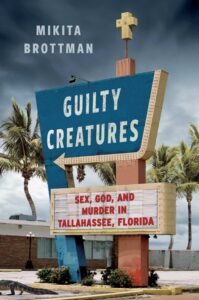Brian Winchester and Denise Williams began a torrid affair in the late 90s, and soon enough decided they wanted to be together for real. The problem? Their communities and families would judge them harshly for getting divorced. They decided the only solution to their problem would be found in murder.
In the crowd, Brian and Denise pressed against each other. They kissed and made out in the dark. October 13, 1997, became their secret anniversary. The two couples had gone to see the rock band Sister Hazel at Floyd’s Music Store, a concert venue in downtown Tallahassee. The lights were low, the music loud, and Brian and Denise disappeared into the crowd. The need for secrecy amped the tension to fever pitch. After the concert, they stayed up all night talking on the phone. “We really connected, like nobody else,” said Brian. “We met up the next day during her lunch break at work, and that’s just what started the whole ball rolling with her and I.”
They’d both been taught that abstaining from sex before marriage would lead to spiritual, physical, and emotional satisfaction. All their lives, they’d struggled to follow the Bible, and when the time came for them to reap their reward, it wasn’t there. They felt cheated.
Now a door had opened. Forbidden sex, it turned out, was a lot more exciting than anything that happened at home. At the same time, they couldn’t set aside what they’d learned in church—that adultery was a terrible sin. They could go to hell for what they were doing—which made it even hotter. Denise, in Brian’s words, was “off the charts in bed,” although they hooked up more often out of bed than in it. Like teenagers, they did it in the car, getting to know places they wouldn’t be disturbed. Church parking lots were good for that, ironically. They’d sometimes meet outside Home Depot or at the back of Keiser University, leave one of their vehicles there, and drive off in the other.
Logistically, it was easier for Brian than Denise—he didn’t have to clock in and out. Mostly, they met during her lunch break; she had an hour off work but often took longer. If they had time, they’d get a room at the Ramada or the Hilton or go to Denise’s house since Mike was always at work. “There was a church in the woods off of Meridian,” Brian recalled. “I would park at that church. And there was a drainage ditch that ran from the church through the woods into her neighborhood and I would walk down the drainage ditch.”
When he hooked up with Denise, Brian found everything that had been missing in his marriage—and more. He was spellbound. “I told her all my dirty secrets. She shared her secrets with me about the same things,” he said. “ I had found a woman who shared my enthusiasm for forbidden sexual activities.” They urged each other on, exploring fetishes and fantasies, plotting schemes, taking risks. It was intense. Sometimes they had sex in public places. They once did it on a roof of the state capitol building.
They also managed to meet up out of town when one or the other of them was on a business trip. They hooked up at the Plaza Hotel in New York, in South Beach, Orlando, Destin, and—more than once—in a hotel at Panama City Beach. Just two hours from Tallahassee and a popular destination for college students on spring break, the town was a place to cut loose. Parts of the beachfront had a debauched atmosphere, with adult movie theaters, massage parlors, and swingers’ bars. Brian liked the strip clubs, especially the Show N Tail, with its low lights, padded booths, and mirrored ceiling. He loved going there with Denise, who didn’t get jealous when he looked at the dancers and sometimes even joined him in a threesome with a stripper.
The only time Mike traveled was for business, and Denise often went along. If the trip was local, she’d arrange with Brian to hook up at their hotel when Mike was busy at work. Despite the risks, they didn’t get caught—although there were some awkward moments and a couple of close calls. They ran into one of Denise’s sisters in a Tallahassee shopping mall, and once, when leaving a strip club in Panama City, they met a buddy of Brian’s who was on his way in.
The affair was supercharged, the sex darkly obsessive and intense. They did it up to fifteen times a week. The boldness of their transgression reinforced their mutual admiration, their sense that they were special, smarter than others. After years of obedience and good behavior, they got a big kick out of outwitting their spouses and their families, behaving recklessly, taking perilous chances. Drawn to the edge, they took dangerous risks, gambling on their cleverness and nerve. Their audacity paid off. “We were pretty good at getting away with things,” Brian would recall.
To grow and thrive, an extramarital affair needs isolation from society and the external world. Brian and Denise began to retreat into a private dyad, apart from the wider community. The sex got more intense, and still they didn’t get caught—probably because the affair was so shocking, no one could ever conceive of such a thing. (Psychologists call this “inattention blindness”—we don’t notice things that we’re not expecting to see, even if they’re right in front of our eyes.)
It’s been shown that sexual experiences, even if they’re only fantasies, cause a slackening of religious aspirations and moral behavior, possibly due to their release of self-control. Accordingly, Brian and Denise’s secret connection drew them away from the church. Those around them suddenly seemed narrow-minded and obtuse. Religion, duty, and family faded into the background, along with concern for the welfare of others.
“I had a good wife. . . . And I had Denise on the side . . . in my mind, I had it pretty good.” Why make waves? Brian was happy with the status quo. Denise was less blasé, especially after she got pregnant in 1997 (with Kathy following suit in 1998). In public, everyone was thrilled, but in private, Denise was anxious. She’d tried to use protection with Brian, but they’d been reckless, and she couldn’t be 100 percent sure the baby was Mike’s. On top of that, the timing was awkward—the child came just as she was starting to feel most ambivalent about her marriage. “When we were out at their house for parties or whatever, there was no outward affection between [Mike and Denise],” observed Clay Ketcham’s wife, Patti. To Denise, Brian made Mike seem dull and ordinary. Being pregnant was a good excuse for her to stop having sex with him. And Brian “kept her juices flowing.”
After the baby was born, sex became a problem. Denise had been making excuses to Mike for almost a year, using her postpartum depression as an alibi. When it lifted, she told Mike she was still sore from giving birth. Having a baby made her stop and think carefully about what she was doing, and she realized she was in love with Brian. He felt the same way. “The more we were together, the more we wanted to be together,” he said. “It just snowballed. It got worse and worse.” Now that both couples had young children at home, however, the lovers couldn’t hook up as easily as they used to. Everybody was getting frustrated.
As their relationship became deeper and more serious, Denise and Brian were drawn back into their faith. They started going to church more regularly, justifying their adulterous relationship by telling themselves God sanctioned their love. Why else would he have led them to each other? At the same time, they began, in Brian’s elusive phrasing, “talking about options and ways that we could be together.”
Divorce was the obvious solution, but it would have been devastating to their families. When Denise’s younger sister Deborah had decided she wanted to get married right out of school without going to college, Cheryl remembered a time when her parents had thrown her out of the house. “Warren took all Deborah’s belongings, clothes and everything, and threw them out in the front yard,” recalled Cheryl. “Johnnie and Warren were members of Parkwood Baptist Church. . . . Half of the church sided with Deborah and David over the fact that Warren shouldn’t have thrown her out, and the other half sided with Warren and Johnnie.” Cheryl recalled Deborah’s parents didn’t speak to her for years.
To Denise in particular, divorce was out of the question. She’d been raised to believe divorce was against the Bible, and she couldn’t get over it. “Denise, because of the way she was raised, because of her pride, I guess I can’t say all the reasons, but she did not want to get divorced,” said Brian. She was too self-righteous, too concerned about family and appearances. Social status, money, and her daughter’s interests all spoke against it. More significantly, she didn’t want to share custody of Anslee with Mike. “Better to be a rich widow than a poor divorcée.”
It’s difficult to believe anybody could find murder more palatable than divorce. Morality aside, the risks are enormous. But undue reflection can weigh heavily on the brain, and if a desire is strong enough, cognitive distortions will find a way around moral inhibition. A couple torn apart by the conflicting demands of family, church, and community might begin to convince themselves that murder is the only way out. In the United States, annual FBI statistics (for those that are solved) suggest that a high proportion of murders are committed by someone known to the victim, usually their spouse or intimate partner, often to avoid the consequences of divorce. For men, it’s primarily financial loss they fear—men, more often than women, end up working to support a family they no longer have. For women, the greatest anxiety is losing custody of their children. Although the murder may be carried out so a couple can be together, these aren’t crimes of passion but deeds that are carefully planned, sometimes for years. They are “cold” rather than “hot” acts, transgressions with forethought. Not the heat of the moment, but premeditated murder.
________________________


















